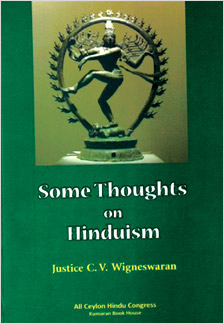Hinduism, in a nutshell
K S SIVAKUMARAN
The All Ceylon Hindu Congress in collaboration with Kumaran Book
House has published a 120 page book in English of Some Thoughts on
Hinduism by Justice C V Wigneswaran, a scholar recently. I thought it is
a useful book to understand the fundamentals of Hinduism which everybody
interested in religious studies would benefit. The book is priced
atRs.500/-per copy.
 Besides the message and the publisher's message, there is also the
preface by the writer. Justice C V writes: ‘By rue religion I do not
mean any specific label given to organised religions but the
understanding of the limitations of the mind and its finite boundaries.
True religion transcends such boundaries or enables humans to
transcend.” Besides the message and the publisher's message, there is also the
preface by the writer. Justice C V writes: ‘By rue religion I do not
mean any specific label given to organised religions but the
understanding of the limitations of the mind and its finite boundaries.
True religion transcends such boundaries or enables humans to
transcend.”
What the book contains is explained thus: “This publication is a
selection of some of my public speeches based on Hinduism, Hindu ideals,
Hindu saints and the Hindu way of life. Many speeches in this series
refer to the possible inputs Hinduism could provide in the resolution of
conflicts, in achieving peace and harmony, in effecting reconciliation
and co-existence within a battered State and other issues facing society
in general. I t is hoped that it would in some measure establish the
continued relevance of religion today.”
There are 11 chapters in this collection of speeches. They are:
Hinduism and Conflict Resolution, A Path to Purposeful Living, Our Quest
for Unity, Communal Harmony and Nation Building, His Holiness Swami
Shanthanandaji, Impact of Religious Leadership on Peace and Harmony,
Guru Poornima, The Role Religions Can Play in the process of
Reconciliation and Coexistence-The Hindu Standpoint, Launching of
Reprint of “Studies in Humanism”, Hindu Culture, The Science of Mantra
and the Platinum Jubilee Celebration of Ramakrishna Mission Students’
Home Batticaloa, held in Colombo.
What does the Justice say about Hindu Culture? The main points:
* Hinduism is a way of life. It is not a religion in the sense in
which other major religions are considered.
* As for Hinduism it has no founder, no one sacred book nor is it
known as to when Hiduism started.
* Culture is refined living that arises generally in a peaceful
stable society. It is the state of development in intellect, emotions,
interests, manners and tastes in a Society at a given time.
* Religion and Culture are inseparable. You cannot talk about Culture
without implying Religion nor about Religion without implying Culture.
* India is one of world's most ancient civilizations while Hinduism
is the world's oldest living religion.
* For over five thousand years the Sanathana Dharma influenced
India's intellectual life and almost completely determined India's
social and cultural life as well.
* This large and complex socio-religious organism consists of
innumerable sects, cults, philosophical systems involving various
rituals, ceremonies and spiritual disciplines.
* Hindu Culture had spilled over to Sri Lanka even before the birth
of the Buddha.
* Two of the core beliefs are that of tolerance and pluralism.
* Basically Hinduism is of the view that Truth is One but that Sages
call it by different names and in different ways.
* But Truth could appear differently to different people according to
their understanding, capability and environment. The Truth depends on
the perceiver and his potentialities. From this attitude of recognizing
differences among votaries of various Religions comes great tolerance
and inclusiveness which is characteristic of Hinduism.
* Vedas are the outpourings of many Saints, Sages and Seers. The
Vedas are four in number. They are Rig, Saama, Yajur and Atharvana
Vedas. Each Veda is divided into fore sections known as Samhitas,
Brahmanas, Aaranayakas and Upanishads.
* Upanishads deal with metaphysical problems relating to God or Para
Brahman, Soul or Atman, Liberation or Mukthi etc.
* Society was recommended by the Saints, Sages and Seers to journey
through the four Ashrams or stages of life -- Brahmacharia, Grahastha,
Vaanaprasastha and Sanyaasa, which represented the natural growth in
human life.
* The basic spiritual instruction in Hinduism is that the multitude
of things and events around us are but different manifestations of the
same Ultimate reality -the Para Brahman. Thus Hinduism is essentially
monistic in character in spite of the worship of numerous gods and
goddesses.
* Hinduism, like its daughter Buddhism, is premised on realization
and not revelation.
* Another important facet of Hindu thought is the playoff Karma in
life. Karma means action. To be free from the spell of Maya (Illusion),
to break the bonds of Karma means to realize that all the phenomenon we
perceive with our senses are part of the same Reality
* It means to experience concretely and personally that everything
including our own self is Para Brahman. This experience is called Moksha
or liberation in Hindu Philosophy and it is the very essence of
Hinduism.
I shall stop here. Justice C V Wigneswaran's speeches are very
absorbing and analytical and it is a treat to understand many things
from him not only on culture and religion but also on many other things.
Please read the rest of the chapters to find out what Hinduism means.
[email protected] |





